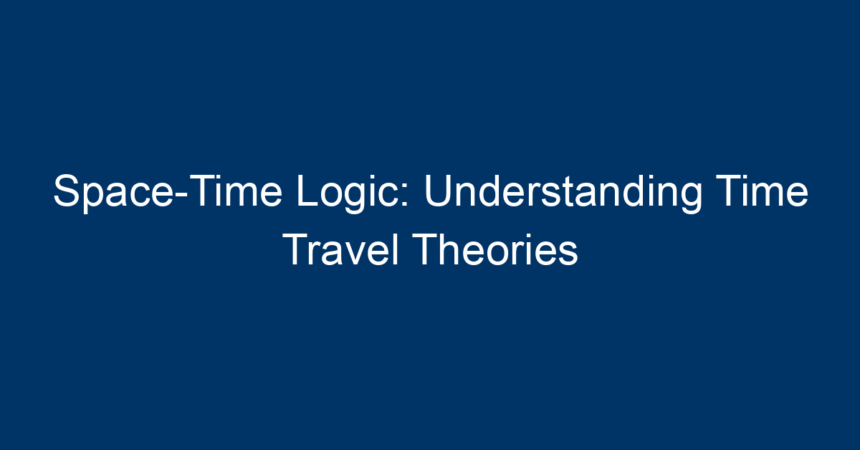Time travel has long captured our imagination, stirring visions of journeys through the past and future. But beneath these fanciful notions lies the complex realm of space-time logic, a framework developed by physicists to understand the fabric of the universe. In this article, we will delve into the theories and concepts that underpin time travel, exploring how space-time logic intersects with our understanding of time, causality, and the universe itself.
What is Space-Time Logic?
At its core, space-time logic refers to the mathematical and conceptual framework that describes the relationship between space and time in the universe. This concept is foundational in modern physics, having been pivotal to the development of Einstein’s theory of relativity.
The Fabric of Space and Time
In Einstein’s theory, space and time are not separate entities but rather intertwined dimensions that form a 4D construct known as space-time. This perspective fundamentally changes how we perceive time. Traditionally viewed as a linear progression, time, according to the theory of relativity, can be warped and manipulated by gravity and speed.
Space-Time Continuum
The space-time continuum is a model where time is treated as a dimension similar to the three spatial dimensions. Events are marked by their position in this four-dimensional framework, allowing for a clearer understanding of how time travel might theoretically work. The concept of the space-time continuum is crucial when discussing various time travel theories.
Theoretical Foundations of Time Travel
Several theories emerge from the principles of space-time logic, each providing unique perspectives on the possibility of time travel.
1. Wormholes: Portals Through Space-Time
Wormholes are theoretical passages through space-time that could create shortcuts between different points in time and space. Visualized as tunnels in the fabric of space-time, these structures could potentially allow for time travel if they exist and could be stabilized for navigation.
The Traversable Wormhole
Physicists Kip Thorne and Michael Morris proposed the concept of traversable wormholes. These would allow for safe passage for travelers from one time to another. However, the existence of wormholes is still hypothetical. If created, they may require exotic matter to keep them open, a substance that has not yet been discovered.
2. Time Dilation
Time dilation is a phenomenon predicted by Einstein’s theory of relativity, which states that time passes at different rates depending on the relative speed of observers. For example, astronauts traveling at high speeds in space experience time much more slowly than people on Earth—a concept illustrated through the famous twin paradox.
Practical Implications of Time Dilation
Time dilation has been experimentally validated using atomic clocks on aircraft and satellites. This has profound implications for our understanding of time travel: theoretically, if one could travel close to the speed of light, they could traverse substantial durations into the future relative to those left on Earth.
3. The Grandfather Paradox
When discussing time travel theories, one must confront paradoxes that arise from the very concept. The most famous is the grandfather paradox, which poses a question: What happens if a time traveler goes back in time and prevents their grandparents from meeting? This potential alteration of the past could render the time traveler’s own existence impossible, creating a logical contradiction.
Resolving the Paradox: Many Worlds Interpretation
One interpretation of this paradox is the Many Worlds Theory, which suggests that every decision creates a new universe. Therefore, when a time traveler alters the past, they don’t create contradictions but rather branch into a parallel universe, allowing the original timeline to remain unchanged.
Practical Aspects of Time Travel
While the theories developed from space-time logic present imaginative possibilities, the practical aspects of time travel are fraught with challenges.
Energy Requirements
One major hurdle is the energy required to manipulate space-time. Creating and stabilizing a wormhole or achieving the necessary speeds for time dilation would require an incomprehensible amount of energy—much more than we currently possess.
Ethical Considerations
The ethical implications of time travel also pose significant questions. Would it be moral to alter past events? What responsibilities would time travelers have toward the timeline they visit? Understanding the ethical dimensions of time travel is integral to any potential future developments in this area.
The Role of Space-Time Logic in Popular Culture
Popular media has significantly shaped our understanding and imagination of time travel, often simplifying complex theories for storytelling purposes. Movies like "Back to the Future" and "Interstellar" provide entertaining explorations of time travel, yet they occasionally sensationalize scientific concepts.
Bridging Science and Fiction
While these representations can be fascinating, they may mislead audiences about the possibilities of time travel. Therefore, it’s essential to distinguish between actual scientific theories rooted in space-time logic and fictional narratives that prioritize entertainment over accuracy.
The Future of Time Travel and Space-Time Logic
As we continue to explore the universe and deepen our understanding of space-time logic, the quest for time travel persists. Quantum physics, string theory, and other advancing fields of science may one day provide insights into the feasibility of time travel.
Advancements in Understanding
New discoveries, such as breakthroughs in quantum mechanics and theoretical physics, can alter our understanding of space-time dynamics. Researchers are continuously striving to find answers to the fundamental questions about the universe, including the nature of time itself.
Conclusion: The Quest for Understanding Time Travel
Time travel remains one of humanity’s most captivating prospects, driven by the intricate principles of space-time logic. While the road to time travel is fraught with complexities, understanding these scientific foundations provides a richer appreciation for the potential of our universe.
Actionable Insights
- Stay Curious: Exploring books, documentaries, and lectures on physics can amplify your understanding of space-time and time travel.
- Engage with Science Communities: Online forums and local science groups often discuss contemporary theories and findings in physics, fostering an engaging learning environment.
- Research: Keep an eye on advancements in theoretical physics and cosmology, as ongoing research may bring us closer to understanding the reality of time travel.
As science evolves, so too does our understanding of time and space, inching ever closer to the possibilities once reserved for science fiction. Through informed exploration and engagement, we can all participate in this magnificent journey into the unknown.




